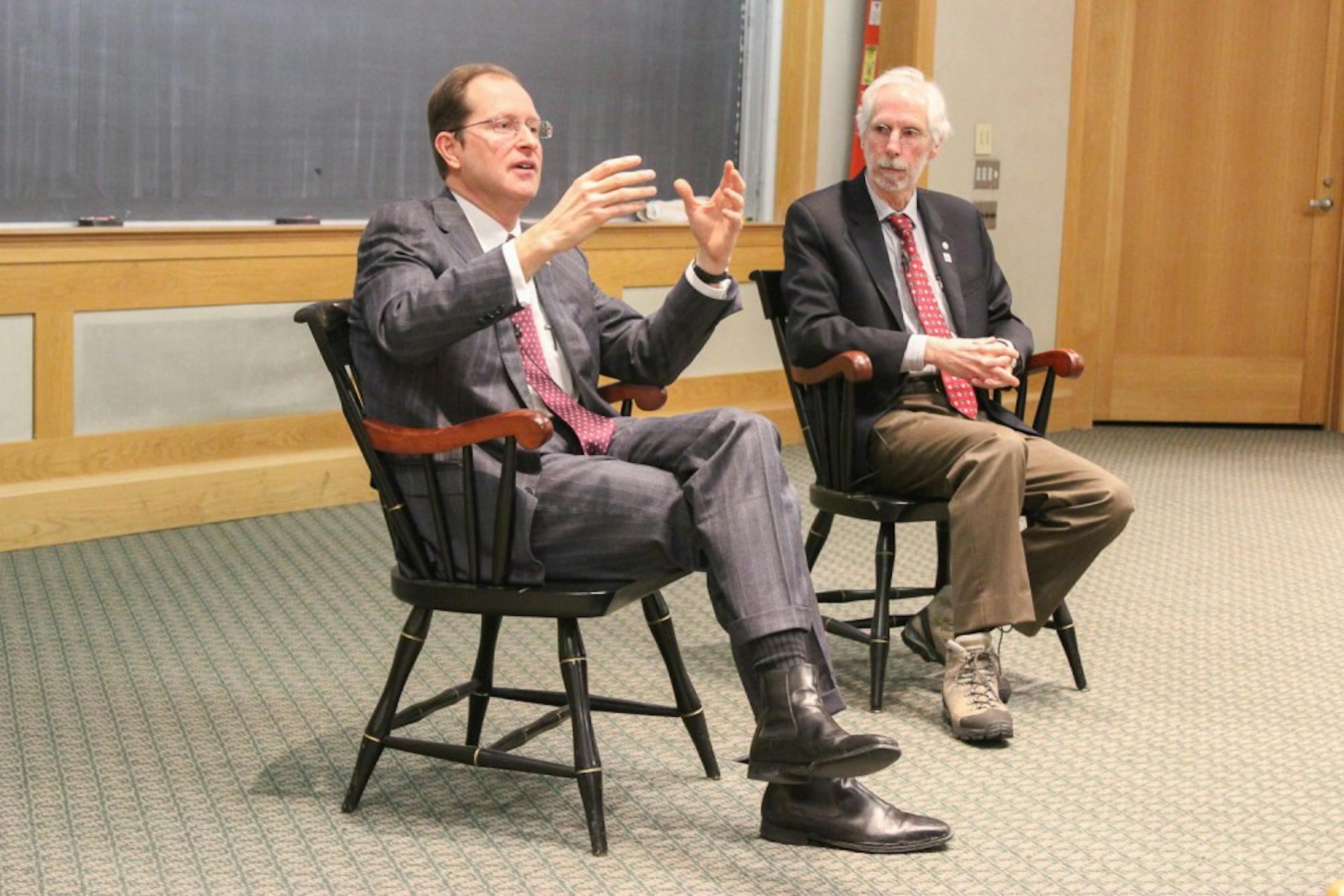United States Ambassador to Sweden Mark Brzezinski, a member of the Class of 1987 addressed climate change, diplomacy and Arctic policy in his Monday lecture titled “#OurSharedArctic: U.S. Embassy Sweden and Modern Diplomacy.” Brzezinski is one of the 2015 winter term Montgomery Fellows and was in residence on campus from Feb. 14 through 17, His work on campus focused on the theme “Climate Change and Society.”
Brzezinski opened his lecture by discussing the extent of global warming and climate change in recent years. Thirteen of the warmest years on record have occurred since 2000, Brzezinski said. The melting of polar ice caps that reflect solar energy back into space creates dark water that instead absorbs heat, which Brzezinski said contributed to the overall warming of the planet.
“What happens in the Arctic doesn’t stay in the Arctic,” Brzezinski said. “There’s a direct interaction between what happens in the Arctic and what happens in the rest of the world.”
He said that the effects of warming in the polar ice caps can be seen across the country, even here at the College. Brzezinski noted that while the region still experiences extreme cold, global warming has led to already noticeable damage to apple crops, maple sugaring and the ski season in the New Hampshire area.
“Scientists are predicting and project catastrophic consequences for mankind and the planet if we stay on the current global warming path,” he said.
Brzezinski estimated that the international community has approximately 20 years to act before it “may be too late.” In order to successfully combat the warming trend, Brzezinski highlighted the need for a collaborative approach that incorporates a range of international perspectives.
He said that this was exemplified in a 2013 visit to Sweden by President Barack Obama, during which he met with heads of government from Denmark, Finland, Iceland and Norway and former Swedish Prime Minister Fredrik Reinfeldt to work on solutions to combat climate change. He said that this process involved reaching out to other countries and multinational development banks to secure support.
Brzezinski noted the shared culture of sustainable innovation in Sweden and the United States and said that the private sector would be crucial to this movement’s continued success. Awareness and advocacy also play key roles in solving this issue, Brzezinski said.
“Part of the problem is that too few people know about it,” Brzezinski said. “Vast numbers of people are unaware of the imminence of this threat and time is not on our side. The generation after the next generation will really feel it.”
Brzezinski has made use of social media to promote public awareness around the issue of climate change. He produced a series of videos titled “Our Shared Arctic” that can be streamed on YouTube. The videos focus on the societal impact of climate change and briefly feature Dartmouth’s Institute of Arctic Studies director Ross Virginia.
Virginia said that the lecture exposed students to Brzezinski’s narrative as a successful alum that demonstrates the formative and powerful nature of a Dartmouth education. He noted that he hopes the lecture would serve as inspiration to students.
“He’s an ’87, but Dartmouth students today still have that same drive and desire to do good work that changes the world,” Virginia said.
Virginia said that the arctic is a “critically important region of the world.” He noted that our lifestyles release greenhouse gases that contribute to rapid climate change in the arctic that then affects our climate in return. The issue is critical to the future, he said, noting that 15 of the world’s largest cities are along coastlines that could be affected by rising sea levels.
He said that Brzezinski emphasized the arctic as “a global space” that all people share and have a responsibility to protect. Virginia noted that the mission of the Dickey Center for International Understanding is to deal with great issues, and that one of the most important challenges we face is climate change. Virginia said that students from all academic backgrounds can play a role in combating climate change.
He added that he hoped students walked away from the lecture pondering what role they can play and with a broader understanding of the challenges climate change presents.
“When I was a student sitting in those very seats, I never could have imagined standing before you as an ambassador, as the personal representative of a historic president deployed in a country where my passion matches the core issues of our engagement,” Brzezinski said.
Brzezinski said that Dartmouth allowed him to pursue work in public service.
Anthony Addo ’18 said he attended the lecture because he has been exposed to the issue of climate change and found it a “frightening” prospect. He said he wanted to see the people at the forefront of combating climate change after high exposure to disastrous news on the subject.
He said the lecture focused on the dangers of climate change and reassured him about the presence of people who work to mitigate the affects of climate change.
He noted that with lectures such as this one, engaged students attend while students who could learn a lot often do not.
“I really think the issue is becoming more pressing and people are becoming more aware,” Addo said.
The second Montgomery Fellow, soil ecologist Diana Wall, will be in residence Feb. 28 through March 7. Her public lecture, “Soil Biodiversity in the Cold: Life in the Antarctic Dry Valleys,” will take place on Tuesday, March 3, in Filene Auditorium.




